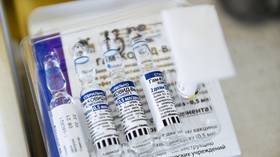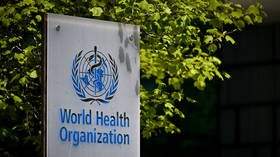WHO official reveals when Russia’s Sputnik V jab could be approved

Despite a series of delays, the World Health Organization (WHO) may give the green light to Russia's flagship coronavirus vaccine as early as the first few months of next year, the organization's European chief has told RT.
Speaking as part of an exclusive interview on Thursday, Hans Kluge, the global health body’s regional director, said that he was hopeful Russia and the WHO could work together to overcome the remaining hurdles for Sputnik V to be approved.
“I share the optimism of the president of the Russian Federation that the WHO emergency use listing for Sputnik V will be there soon,” he told RT. In October, the country’s leader, Vladimir Putin, called on the organization to “speed up” its appraisals, pointing to the fact that the Moscow-made formula has already been given the go-ahead for use in 71 nations across the world.
Before the end of the year, the WHO will receive a dossier of data on the vaccine and will begin reviewing it as soon as January 4, Kluge revealed. Its headquarters will then “go back and forth with clarifications, if need be, and then send the next inspection visit.” In September, officials from the WHO warned that one Russian factory making Sputnik V “did not adhere to good manufacturing processes,” leading to the registration process being paused while potential issues were addressed.
Kluge went on to say that there will be follow-ups on the approval during the first quarter of next year. He also insisted that there "is no-one to blame" on any one side for the delays, saying that the path for new vaccines is complex, and that there is now “a very clear path forward.” According to him, he was “very optimistic” about Sputnik V “from the very beginning.”
The top WHO boss has previously denied accusations that political motivations are standing in the way of approving the jab, after a number of Russian officials alleged that Western nations were working to delegitimize their country’s domestic formulas. Sergey Naryshkin, the head of Moscow’s SVR foreign intelligence agency, said in May that delays to the EU’s long-running appraisal of Sputnik V were because of pressure from the bloc’s leaders. “We reliably know that this procrastination is related to signals that come from on high,” the spy chief said. Brussels has still not granted approval for the jab, despite research showing it is among the most effective vaccines available.
Kluge also expressed concern about the rise of the new Omicron variant of Covid-19, which has sparked new restrictions and border closures across much of the world, with scientists warning it could be more infectious than previous strains. However, the top official said that the international health body is hoping to provide clarity on preliminary reports that Omicron could be less severe than past forms of the virus, and urged nations to “boost, boost, boost” to increase vaccine coverage.
“The appetite is growing” among world leaders for greater alignment on health policies as a result of the new variant, he added, arguing that a lack of consistency between countries “confuses the people” and “does not help trust” in politicians. “That is why the WHO is advocating to establish a pan-European health threat council at a high level, to have uniformity in policy,” Kluge went on. “But ultimately, still, health is a national competency.”














